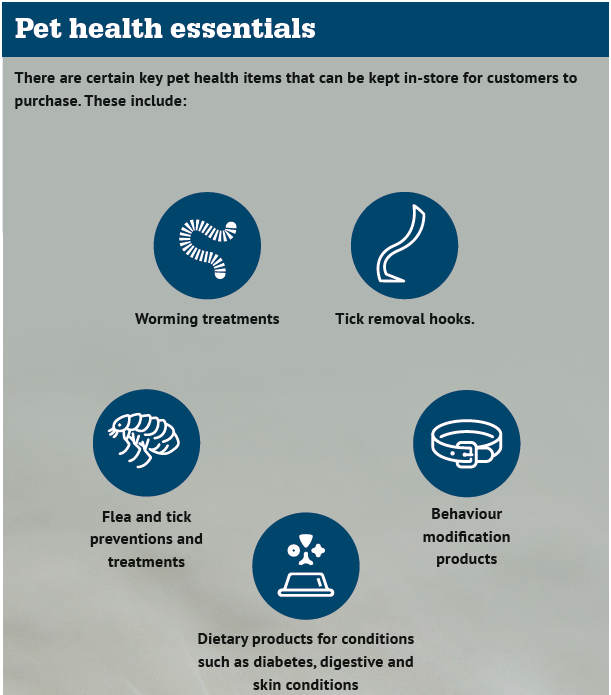Pets, vets and pharmacy
In Families
Follow this topic
Bookmark
Record learning outcomes
Covid-19 has prompted many people to seek companionship in the form of new (and old) pets. Take a look at what this means for pharmacy

The range of petcare products available in pharmacy and at supermarkets has historically suffered from a problem: they have been considered by vets to be inferior to professional veterinary products.
While it’s true that some OTC products may have been less robustly tested than vet-only products, many veterinary grade pharmaceutical manufacturers have now declassified products so that they are available for general sale in retail outlets including pharmacies. And as some vet practices are closed or operating differently in the wake of Covid-19, there is an opportunity for pharmacy to promote pet care products to customers.
Shoppers are likely to be reassured by trusted brands, or by products that have historically had a prescribed POM-V licence to ensure quality and safety. Pharmacy teams can help customers by creating clear in-store signposting and displays that contain product and pet suitability information. Pharmacies could also consider using cross-category displays – adding pet care lines to shelves containing animal allergy medications, for example.
Current sales trends in pet care medication are not unexpected. Up to 60 per cent of POM-V companion animal drug prescriptions are now being fulfilled by online pharmacies licensed to sell this category of drug. According to industry research, the numbers have been relatively stable so far throughout Covid-19. For non-prescription animal health products (e.g. therapeutic pet foods) a “subtle increase” in the number of vets encouraging people to buy their supplies online instead of visiting a practice has been reported.
Abbie King, senior behaviour product manager for Ceva Animal Health, the manufacturer of Feliway and Adaptil, suggests that Covid-19 has also had a direct effect on pet health, as well as affecting consumer desire to take on an animal. She explains: “The Feliway and Adaptil ranges are designed to help dogs and cats cope with stressful situations. We’ve certainly noticed that Covid-19 has had a negative effect on many cats. They are not used to having their owners home all the time and they prefer to be alone.”
Conditions such as cat cystitis, which can be a side effect of stress, are being reported more often.
While dogs are thought to be quite happy about having their families around them since lockdown, Abbie anticipates a negative effect when owners are back at work. “There have been a lot of happy dogs,” she says. “However, when we all go back to work and they are home alone again, there is a lot of talk about separation anxiety.”
New research from Frontline reveals that two in five owners say they are worried about their dogs when the lockdown is fully lifted, while 42 per cent say their dog will be confused when their owners are out of the house more. With this in mind, the brand has launched a “Pawfect Playlist” in partnership with Spotify. Brand technical adviser at Boehringer Ingelheim Animal Health UK Geoffrey Guyot says: “The return to work will be tough on dogs who have got used to spending so much more time with their owner. The playlist is aimed at keeping dogs calm while their owner is away.”
In the wake of Covid-19, there is an opportunity for pharmacy to promote pet care products to customers
New owners
Since lockdown came into force, lots of people have purchased puppies or kittens, and may not know how to handle them. It’s possible that some owners may turn to pharmacies for advice, while others will not be aware that pharmacies stock pet products. This makes now the ideal time to make more of pet product ranges.
Pharmacy teams can also refer consumers to local vet services – their websites should give details of opening information and phone or video consultations. Resorting to Google and getting an online diagnosis for poorly pets is firmly discouraged by
vets and animal health experts alike. Customers can, however, be referred to the British Veterinary Association (BVA) website, which offers advice for owners and signposts to other sites.
Dealing with fleas
Pet owners are not always aware that managing flea infestations requires a two-pronged approach. While using a treatment product on cats or dogs may kill fleas and eggs on the animals, it is likely that there will be unhatched larvae in the home. Management therefore requires long-term tactics to prevent recurring issues.
Pet owners should be advised to protect against infestations by using regular flea prevention procedures, such as applying spot on treatments to their pets.
If there is an infestation and there are a number of pets in the household, they will all need to be treated, even if only one animal has obvious fleas. In addition:
- Pet bedding should be washed at a hot temperature to kill fleas and eggs. Soft toys also need to be washed or, if this isn’t possible, disposed of
- Pet bedding should be tumble dried rather than line or air dried, if possible
- All floors, carpets, rugs and sofas must be vacuumed and the vacuum cleaner emptied
- A vet-approved household flea spray should be used throughout the home
- All bedding in the house should be washed at a high temperature. Cushions, curtains and sofas will also need to be treated with flea spray after washing removable covers/curtains on a hot wash
- If an infected pet has been in a car, the car will also need to be vacuumed and sprayed.
Worming advice
Cats and dogs should be wormed regularly to prevent infestations, as some worm infestations may be asymptomatic. The recommendation is for adult pets to be wormed at least four times a year, but puppies and kittens need to be treated more often.
Vaccinations
Ideally, pets should be vaccinated regularly. Some components of recommended vaccines are required annually, so the general advice is to visit a vet every year for a health check and to ensure that pets remain fully protected.
The BVA produces a ‘Getting Your Pet Vaccinated’ leaflet containing specific guidance that consumers may find useful. It can be downloaded from here.
The PDSA advises that if dogs or cats have missed a vaccination or booster because of lockdown, dogs should be kept away from other unvaccinated dogs and areas that lots of other dogs frequent, while cats should be kept indoors until they can get an appointment with a vet. You can direct customers to PDSA for further information.

Views from the P3pharmacy category panel
Sarina Mughal, Day Lewis, Knightsbridge
“We don’t get many queries for pet health, although we do dispense veterinary prescriptions. Common queries tend to be mainly about flea and tick treatments. The best seller across all our Day Lewis pharmacies is the Frontline brand. Pet products are kept in stock in our pharmacies all year round, but we don’t keep large quantities. There is definitely more room to grow the pet category in pharmacy, but it does depend on your location. If you’re near to a vet’s then it’s going to be more popular.”
Lila Thakerar, Shaftesbury Pharmacy, Harrow
“We used to have quite a large category, but we find we just don’t get much demand for these products any more. If a customer asks us for a specific pet health product then we can order it in the same day for them, so it’s just not worth committing money to stock that sits on the shelf. Requests are usually for products to treat fleas or ticks or a bite. I don’t see this market growing in the future for pharmacy. There are just so many more OTC products available now in other more profitable categories that it makes sense to invest in these instead.”
Yasmeen Asfar, Well Pharmacy, Hartlepool
“A huge portion of the population has a pet, therefore this category has grown in importance over the years. Typical queries are based primarily around flea, tick and worming treatments, and products that sell well in treating these are mainly from the Frontline and Drontal ranges. More customers are aware that pharmacies have these products in stock, and at competitive prices, which makes this a growing category. We always have a free-standing display unit with dummy boxes showing the range of products that we keep.”
Frontline on TV
Frontline is supporting the category with a media campaign including Frontline Plus TV spots spanning the next four months – the peak flea season.
